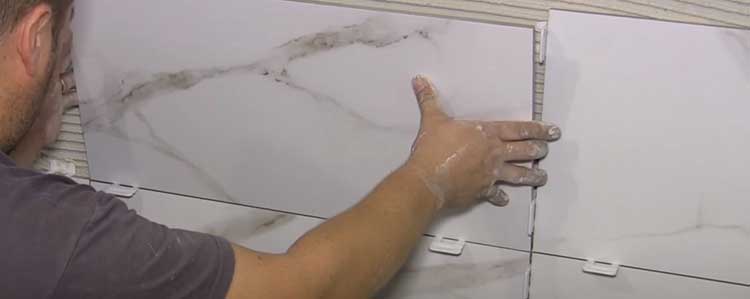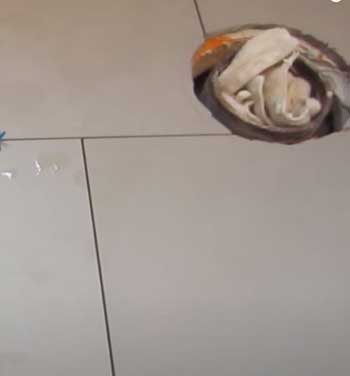When you need a seamless surface for your bathroom floor, you need rectified tiles. With straight edges, the visible lines between the tiles become subtle. However, that’s not the only goal of rectified tiles.
But to make a good decision whether you should have it or not, you should have a clear understanding of rectified tile pros and cons. Yes, it has some downsides too!
So, stay with me for a while and see whether you should have these tiles for your bathroom.
Quick Pros & Cons of Rectified Tiles
| Advantages | Disadvantages |
| Offers a sleek, seamless modern look. | Not suitable for the uneven floor surface. |
| Minimal requirement of grout. | Complex installation than regular tiles. |
| Larger tile size. | Prone to chip in corners. |
| Hygienic and easy to clean. | A little bit more expensive. |
Let’s talk about these benefits and downsides in more detail. You will also see how it’s different and better than non-rectified tiles.
Why Should You Install Rectified Tiles?

It’s still a new concept in the tile industry but surely has made a big buzz. So, let’s see why you want rectified tiles:
- Sleek & Seamless Look
The ability to place the rectified tiles close together and thus have a sleek and seamless look is the biggest benefit. For modern design, this look simply can’t be ignored.
To be more precise, you don’t need to join the tiles so that you can have a continuous surface. And that’s the beauty of rectified porcelain tiles.
Since there will be minimum distance between the tiles will be 1.5mm to 3mm only, you will need less grout with an almost clean and crisp seamless surface!
- Diversified Options
When it comes to choosing rectified tiles, you have a multitude of various options. Rectified tiles are available in different formats, appearances, and models.
They have a wide variety of finishes like marble/stone effect, natural wood, etc. So, you will have no problem matching the style of your bathroom interior at all.
- Larger Sized Tiles
Modern design requires to use of large format tiles. If you want that too, rectified tile is your answer. Usually, rectified tiles are larger in size (larger than 15″ or 16″ in any direction).
Besides, the minimal grout requirement will give your floor the impression of a large tiled space!
That’s a great noticeable benefit of such tiles. It also makes the installation process a little bit faster as well.
- Thin Grout Lines
Traditional tiles have around ⅛” grout lines. That gives a classic look. But not everyone is fond of such a classic or natural look.
With rectified tiles, the grout lines will be much thinner—almost invisible to the naked eyes.
- More Hygienic And Easy Cleaning
That’s another good feature of rectified tiles. With less requirement of grout, there will be less space for bacteria and mold to grow.
That’s why rectified tiles are more hygienic than non-rectified tiles. It also makes cleaning the wet spots a lot easier.
- Very Durable
Extra works are a must to manufacture rectified tiles and they have to be made from high-quality raw materials to maintain integrity while cutting for sharp edges.
So, rectified tiles are undoubtedly long-lasting than their counterparts.
Disadvantages of Rectified Tiles

Before I mention any downside of those tiles, I must tell you that their benefits outweigh their downsides by a huge margin.
Besides, I have already mentioned its potential downsides in the above comparison table. That’s actually all the cons I could think of!
But since nothing is free of disadvantages and I think to elaborate some points, there are 2 negative sides of rectified tiles:
- Relatively Expensive
That makes sense, right? You are getting high-quality tiles that are larger in size and require a complex manufacturing process.
So, yes, rectified tiles are a little bit more expensive than non-rectified tiles.
- The Edges Can Chip
That’s another potential downside of rectified tiles. The edges of the rectified tiles especially on the outer edges may chip.
I am not saying it will happen, but the sharp edges are not as protected as the edges of the non-rectified tiles.
Frequently Asked Questions (FAQs)
The biggest advantage of rectified tiles is that they can be laid together very closely due to their rectified edges to have an almost seamless look on the floor. For a clean and symmetrical tiles installation, they are worth it.
It depends on the type of space you have and your own preference. To use decorative grouts, non-rectified tiles are good but for a modern look with seamless finishes, rectified tiles are preferable.
It’s always recommended to use grout irrespective of whether you have rectified or non-rectified tiles. Grout will protect the rectified tiles against movement and it makes cleaning the tiles easier in wet areas.
It requires some extra work to produce rectified tiles. So, yes, rectified tiles will cost you a little extra.
You can place the rectified tiles very close to each other but there should be a minimum distance of 1.5mm. This space will be used by the grout.
Closing Remarks
Just like non-rectified tiles, there are both pros and cons of rectified tiles as well. It’s a little more expensive but the sleek modern look they offer can’t be ignored.
Your bathroom deserves better and the tiles play a great role to keep it shining and beautiful. Without worry, you can install rectified tiles for your bathroom floor.
